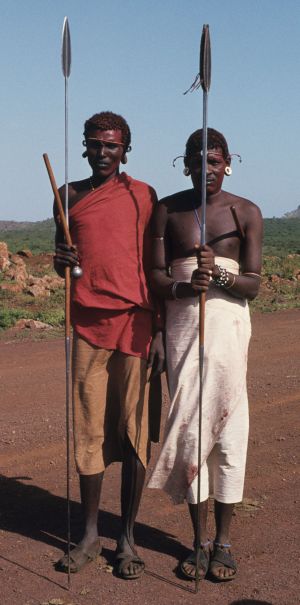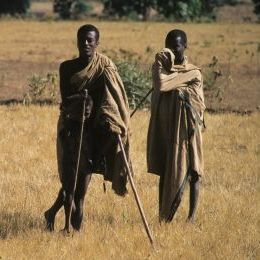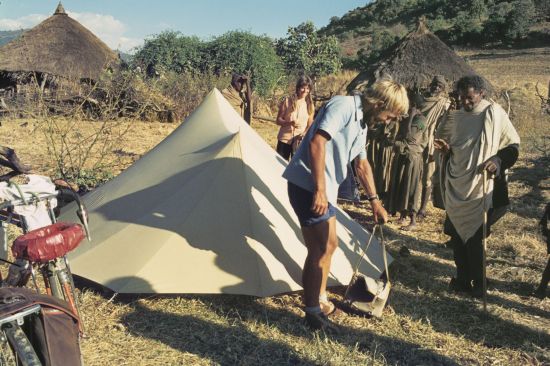| Barelds - Cycling around the world - Cycle stories - Asia, Africa, Europe, America | ||||||||||||||||||||
| home | site map | world | children | recent | cooking | dutch | german | react | ||||||||||||
Eastern and Southern Africa 1973 (3).

Kenia: Warriors of the Samburu tribe armed with club and spear.

Ethiopia: Characteristic posture of the shepherd - leaning on their staff cloaked in worn out cloths, the little ones wearing nothing.
At our break we cooked our last bit of rice, dried dates and some sugar that was all we had in our panniers. The air became increasingly cooler, nature more exuberant, birds, butterflies, monkeys in lush green. The height of the pass seemed to lie in front of us. When we arrived there the road turned to the other side, and endlessly zigzagging it went upwards. From exhaustion, the bicycle, which we had to push on steep parts with loose stones, often slipped out of my hands and I almost failed the power to pick it up again. No food and no fuel left, no villages no water. Finally at the fall of darkness, we reached the top. All of a sudden we were surrounded by little boys. "Here is a hotel" one of them pointed out, another one got some rolls for us and the third one ran away with our empty oil can to fetch some fuel for us.
Also the schoolmaster came and offered us "tej" a sweet honey wine, and "injera" a spongey pancake the size of a bicycle wheel. The lady hotel owner brought us a bottle of water for our "bath" and had beds - with flees - in small rooms for 1 person.
As flat as a pancake, a French trekker in Sudan described to us the plateau, which comprises a great part of Ethiopia. The well-known unreliable information of motorised travellers who go too fast to survey the things. There was not one meter flat up there. It was indeed quite a bit cooler, a boon after the 45 degrees in Sudan.
In front of us walked a man and a woman, she in traditional clothes, white loose dress with colourful borders, he in shorts and the stick over his shoulder, he grabbed with both hands the ends, like all men do here. Suddenly the woman began to scream, the man raised his stick immediately. They looked around and all of us had to laugh. "Tenesteli" we shouted and they bowed and scraped. The schoolmaster had taught us some Amharic and it seemed like a real magic word. Nobody ran away anymore, everybody bowed and smiled.

Ethiopia: The village chief first offered us a hut when we wanted to put up our tent in their village. At night he slept before the tent to protect us against bandits!
When we entered Gondar, for us the first town, the secondary school was out, streams of youngsters on the road. At the postoffice, we were going to collect the mail - the square filled with people. "We have never seen tourists on bicycles!" they said in surprise.
Everywhere where we walked through the city, the next day, we heard them murmur: "Cycle, cycle, cycle" All the children wanted to shake hands with us. "This one also", the boy pointed at a kiddy about two feet tall in a ragged shirt, who already stretched out his hand.
On Saturday from far and wide people streamed into the market all on foot. Not many kinds of food were available, we only could stock tomatoes, onions, oranges and a gourd filled with honey - with the bees still in it. The gallows towered high above the market bustle. We were no longer surprised in this medieval country.
We will never make it": Henny said to the policeman, who had to write our exit visa in the passports, "to cycle within 15 days to the border is impossible." We saw the 1000 km before us, as we had already experienced the roads up to here in Addis Ababa; mountainous, crushed to loose sand with loose stones, and when improved, it was done with such, coarse and sharp gravel that within three days a new tyre was already gone to pieces, and Henny had to sow patches on it.
| Start World around | South America | << Previous | Next page >> | |||
| Barelds on bicycle through the world - Cycling in Asia, Europe, Africa, America | ||||||